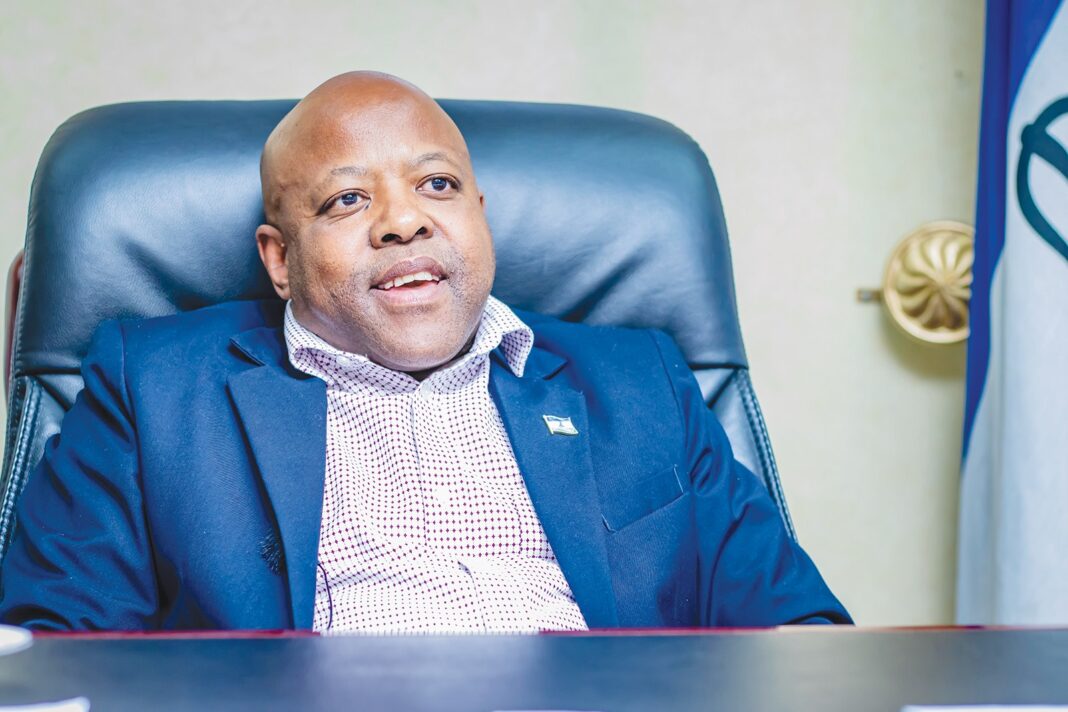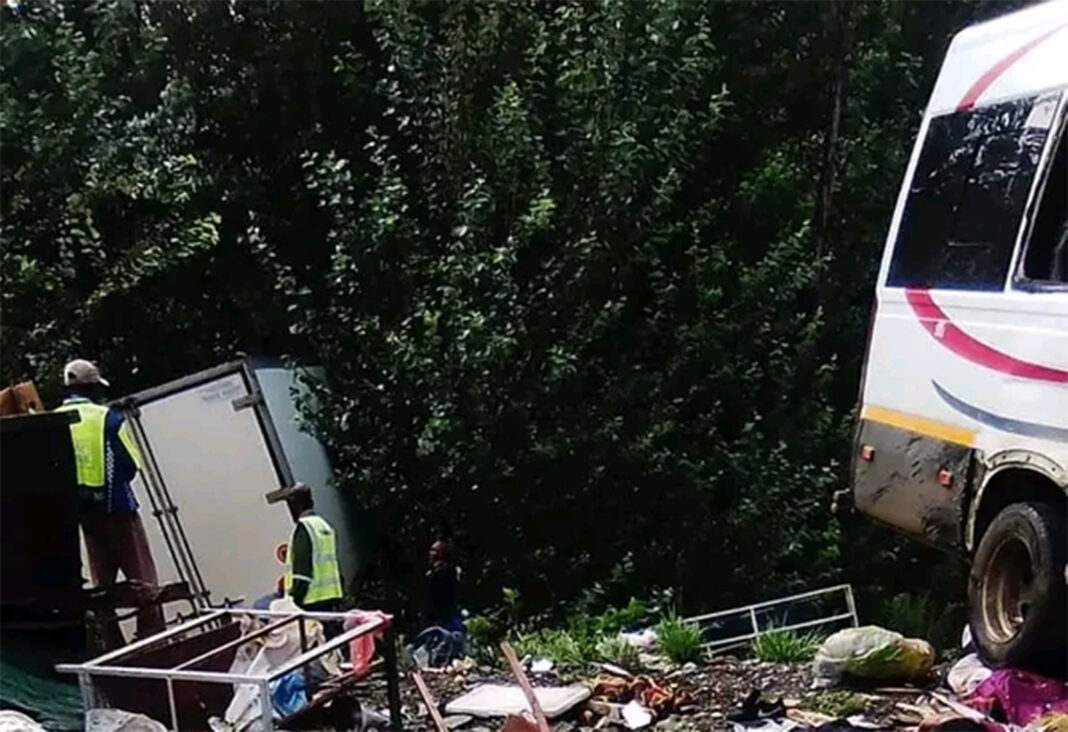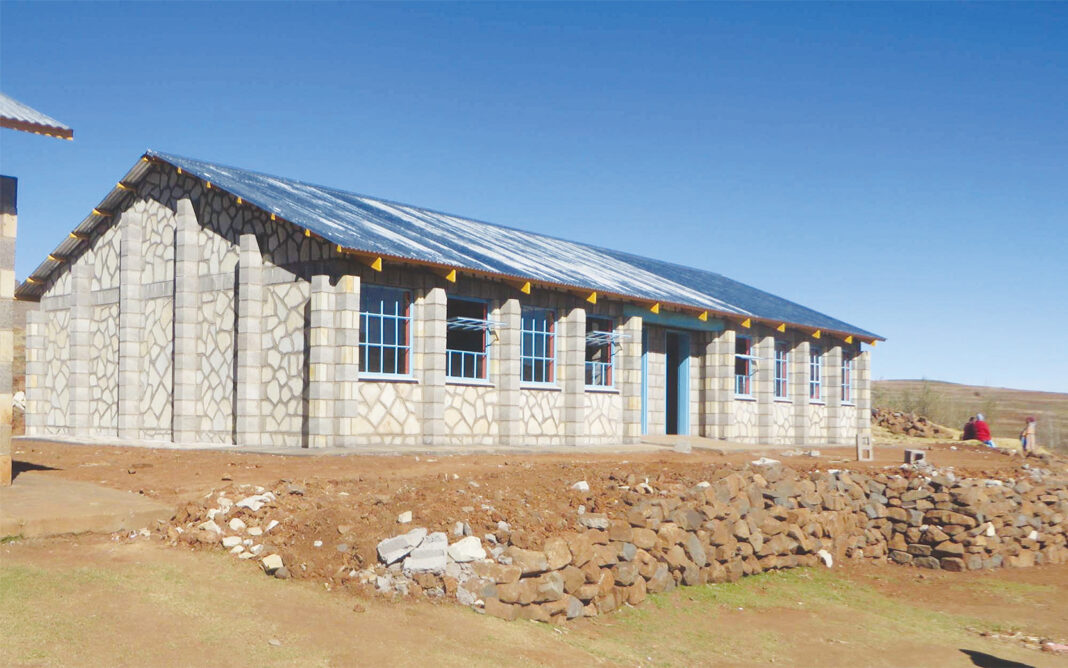By Seleoe Nonyane
The minister of mining Mohlomi Moleko attended a three-day Mining Indaba in Cape Town South Africa that ended on Wednesday. The conference was devoted to the development of mining interests across the continent. Before departing for the indaba, theReporter’s Seleoe Nonyane met up with Moleko who addressed a variety of issues relating to the mining sector in Lesotho.
Seleoe Nonyane: For the sake of ordinary Basotho out there, what is this Mining Indaba?
Mohlomi Moleko: Before we can move into the Mining Indaba Conference firstly, I would love to educate the public about the ministry of natural resources and you will be aware that this ministry can be categorized into three sectors namely the natural resources, water and energy.
This is the sector that was supposed to drive the economy of the country rapidly just like the agricultural sector.
It was my dream to sell Lesotho, other nations should know Lesotho so that when investors want to pitch in and they will already know what to do. So that they know what resources we have. I also want to hold a conference that we will call the Lesotho natural resources conference where we will be showcasing resourcing that we have under water, resources under energy and resources under mining. To do that I realized that there is mining Indaba in Cape Town, this is where I am going to educate myself more about the mining sector and also where I will take the opportunity to attract investors.
I have an understanding that some of the big mining companies will also be attending will be there to show the attendees how they operate. I believe they will present to us how we can work with local investors, communities. So my I will be learning but mostly I want to sell Lesotho.
I will be persuading those people to visit Lesotho so that we can develop the mines in the country.
I also made a plea that I should be given a slot to talk to the investors and to anyone who would be interested.
It will be a learning platform but also I will be there to work. If I just go there to watch and listen to people then then it will not benefit us at all.
The organizers of the mining Indaba are already organizing meetings for me, I will also have a meeting with the ministerial committee which works with issues that affects countries.
Seleoe Nonyane: Which other countries will be taking part in the Mining Indaba Conference?
The Government of Australia asked that I have a meeting with their investors. I also have a session with the minister of energy in South Africa as well as the minister of mining. We will be discussing on how can we develop this region.
Seleoe Nonyane: What can you say is the importance of this Conference and what can be learn about the mines in the country?
It is important because we have to bring together people with prospective licenses and people with funds and resources to develop the mines.
And also bring them together with the regulators which is us the government that ensure that the miners protect the environment, make sure that the miners do not pollute water and make sure they abide by good practices, labour laws, working permits and many others.
The government want to also ensure that they pay their taxes in a proper manner.
The importance is that they share information with other mines and benchmark in terms of work. For example, they must benchmark how they sell their diamonds o how much dollar per current.
They can look at the pollution levels at rivers so that there is no excess pollution and observe the type of technologies those companies use.
As regulators, we do not tolerate pollution at all. We do not want a situation where the water becomes polluted and then no action is taken. As we speak we are in the process of learning as the ministry to make sure that these mines are not polluting.
Therefore, if it happens that they are polluting we will make sure that there are mitigating factors that are done. Therefore, when a miner has his or her own private secretary, it is advisable that they share the information on how they can enhance their work. This makes work more efficient and new technologies used to make mines efficient to the environment all the while being protective towards economic development.
Seleoe Nonyane: Still on the issue of pollution there are mines that are already on the spotlight about pollution, so, what is the take of the ministry on his issue?
We will come up with investors but my concern is that, the same people that report these allegations of pollution some of them have not even went to the mines and approached the management of those mines to put them on the spot and find out what is really happening and find out what the management is saying regarding the pollution issue.
Fortunately, I visited some of these mines some three days ago as to get first-hand what is happening reason being that I was also concerned that if there are truly cases of pollution. I need to make sure that it does not happen at all.
They took me to places they were testing the river waters and we are still waiting for the results. But, they are adamant that pollution is under control. They told me that the limits of nitrates at the rivers are below the norm however, I instructed water affairs to do independent tests as well. The Lesotho Highlands Water Development Authority are also conducting tests because their concern is that the nitrates can go into the dams that are being constructed.
I want make sure that they use independent labs to test the water. It should not just be internal, this will us comfortable when different stakeholders are in agreement because if there is evidence of pollution we will not take it lightly.
They will have to address the issue and I believe they have the capabilities to do so therefore, I do not see pollution as a major concern.
I also looked into the suspicions that there could be the risk of the dam walls collapsing, I wanted to know how is this risk being monitored and they showed me machines they have installed in case of a shift and the width of the walls.
I observed all these issues and I am satisfied but what I need in order to be more satisfied is to have on going tests.
We will issue a press release in the next month and a proper statement of what is really occurring but I am confident that they did not take the pollution issue for granted. They are not dismissing anything as they are aware of the negative impacts of pollution in the country.
Seleoe Nonyane: In your knowledge will this be the first time that Lesotho taking part in the conference?
It is not the first time Lesotho being part of the of the mining Indaba however, I am not aware of the impacts or the rewards the country got from the previous trips but I am hopeful that we will benefit a lot from this trip.
I was not going to attend if I was not to engage with anyone so, the organizers made proper arrangements of who I will be meeting and I have a tight schedule.
Seleoe Nonyane: In regards to artisanal mining, how is it progressing and what are the challenges it has been encountering? What is being done to address those challenges?
I am still learning about artisanal mining as I do not know much about it and I was in talks with miners to find out what is the importance of artisanal mining. So, they told me that there are areas that they are unable to mine which are commercially arable but they believe that artisanal miners can be able to do so.
I therefore, want to see if we can give artisanal miners to make use of those areas. The only challenge is security, what happens when one of the artisanal miners discover a diamond in the presence of others what if they get attacked and secondly, what if the diamond criminals bring a diamond to us claiming that the diamond is from those areas.
Artisanal mining is a good programme that we can pursue I will make more g=finding about it so that we can see how to it can be implemented going forward.
Seleoe Nonyane: There is a policy that states that 95 percent of mining related works have to be done by Basotho entrepreneurs. However, Letṧeng and Kao mines have only accomplished 65 percent, with only two businessmen contracted. So, what are the ministry plans to ensure as many Basotho contractors as possible benefit from the mines?
I am aware of allegations that in the past employment was done by politicians and so one of my mandates is to visit the mines in order to find out what happened because my understanding is that when there is employment the public surrounding the mines need to be first priority and not someone who is a member of a certain party.
They must follow the right procedures and be hired according to their skills and maybe on a first come first serve basis.
So, I will look into it because I have received a lot of complaints and I have to observe before taking any actions. I made it clear we cannot work in that manner at all. I told them that Basotho are going to be given first preference on everything even procurement and they must be sure that I am going to stand firm on that.
Seleoe Nonyane: When we talk about mines, people also assume diamond mining. There has been evidence that there are deposits of uranium and oil in Lesotho; so how soon can we see the government opening exploration of these two minerals?
It has always been my concern that, why should we concentrate on diamonds when there is potential of these other minerals. This is one of my other reason why I will be attending the mining Indaba is to meet with exploration companies that may have an interest in exploring oil and other minerals.
We need to have a digitized database with the resources that are available. I talked to the miners that we must have a project that will survey the areas and I asked that the mines should finance this project.
The survey will help us identify what minerals we have and where before handing out the exploration licenses.
Even with sand stone anyone can apply for the license but we have to look at the environment considerations so that we can make a decision on which areas because we do not want them to be displaced where everyone else can see and find ourselves tainting our beautiful country due to a lack of a proper system.
It is not supposed to be an eye saw we have to find places that are hidden but the law allows the mining of sand stone.









